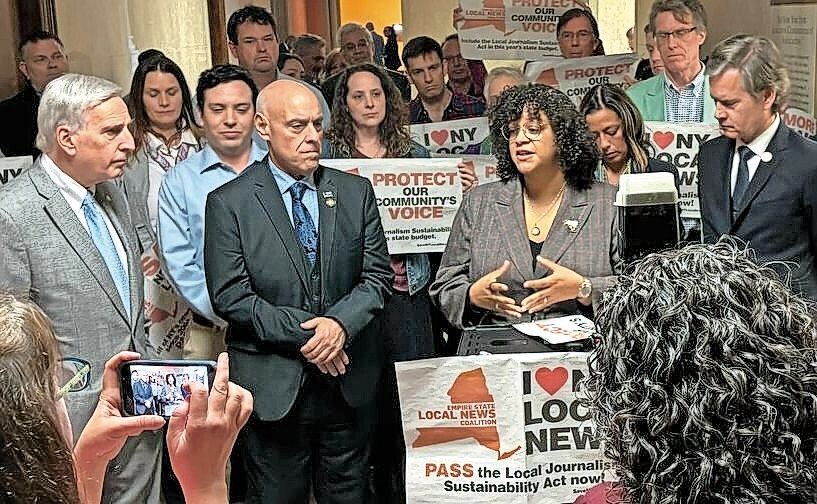Albany pols supporting news ‘sustainability act’
A group determined to save local news in New York rallied in Albany in an effort to bring more lawmakers to their cause.
The Empire State Local News Coalition — a statewide advocacy group of more than 150 local news outlets — joined elected officials at the state capital last week to support the Local Journalism Sustainability Act.
The bill is intended to provide tax credits to local news outlets that employ journalists in their communities. One of its sponsors — Westside-Manhattan state Sen. Brad Hoylman-Sigal — was joined at the rally by Valley Stream Assemblymember Michaelle Solages, Brentwood state Sen. Monica Martinez, and Queens Assemblymember David Weprin.
“This is a full-blown crisis,” Hoylman-Sigal said. “We live in a deliberative democracy. That means our voters need to be informed to make wise choices. How are they informed? Largely through local news.”
The senate included the Local Journalism Sustainability Act in its One House budget resolution, which organizers describe as a major sign of the bill’s growing support in the legislature.
Both the senate and the Assembly release preliminary One House budgets in response to the governor’s own preliminary budget, which was released earlier this year. The state’s final budget, due April 1, will be voted on soon. Saratoga Springs Assemblymember Carrie Woerner sponsored the bill in that chamber.
“It is time that New York state steps up and supports one of the most important industries — not just to our economic well-being, but to our democracy,” Hoylman-Sigal said.
The rally was intended to signal growing pressure on lawmakers to offer benefits to the local news industry, which has experienced a significant downturn over the past two decades.
Hundreds of newspapers in New York State have closed since 2004, resulting in the loss of not only thousands of jobs, but also thousands of stories that helped keep communities informed. In fact, there are a growing number of communities with little to no access to local newspaper coverage, according to coalition officials.
Capped at $20 million statewide, the Local Journalism Sustainability Act is a bill with bipartisan support that provides payroll tax credits for the employment of local news journalists.
News organizations would receive a 50 percent refundable tax credit against the first $50,000 of each newsroom employee’s salary, up to $200,000 per outlet.
The benefit would be limited to print and online newspapers and broadcasters, with 100 employees or less, that cover local community news. This, supporters say, ensures that only truly local news outlets will qualify for this assistance.
“Someone once said that ‘newspapers are the textbooks of democracy, and the lifeblood of freedom,’ and that’s a responsibility newsrooms like ours take very seriously,” said Michael Hinman, executive editor of Herald Community Newspapers, which employs more than 30 journalists across 24 newspapers on Long Island and in New York City.
“Communities depend on their local newspaper. Time and time again, it’s been proven that the best communities in America are communities with a strong, local newspaper. And if we don’t do something now, those great communities will be lost to history.”
But in order for this bill to move forward, it needs to be supported not just by the senate, but also by the Assembly and by Gov. Kathy Hochul, so that it is included in the final state budget.
“The fight to save local news is a fight to save our democracy,” said Zachary Richner, founder of the Empire State Local News Coalition and director of Richner Communications, parent company of Herald Community Media and The Jewish Star. “Hometown newspapers deliver the hyperlocal updates and investigations necessary to sustain a community’s civic and financial well-being. As local news declines, critical stories are lost, and communities become more polarized.”
Solages says she’ll continue to push for the bill’s inclusion in the final state budget with her colleagues in the Assembly.
“We’re continuing our work on Long Island making sure the local story — the story that matters to individual New Yorkers — are heard,” Solages said. “But we really need to make sure we are investing into our community, investing into local journalism, and combatting this growing social media that is spreading misinformation.”
“Our local papers are here. They are objective. They provide information. And we need to preserve that,” she said.

 56.0°,
Overcast
56.0°,
Overcast 




